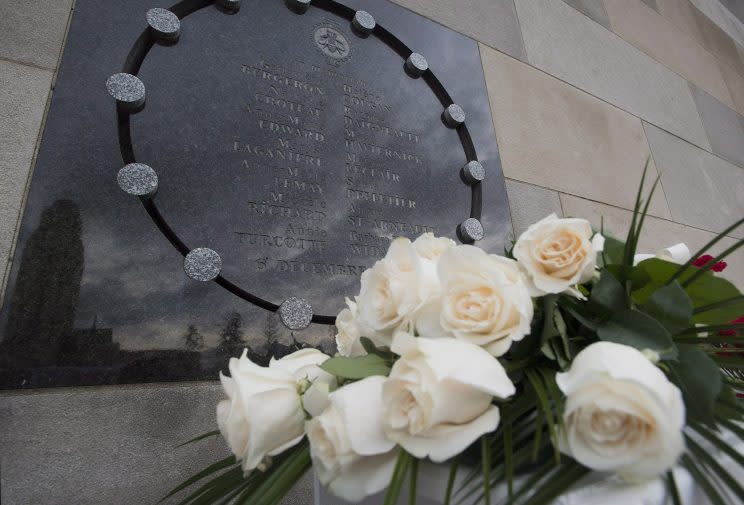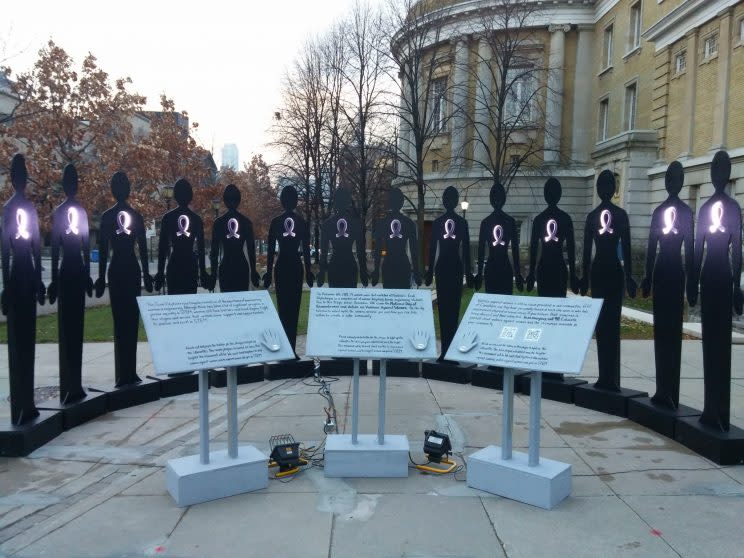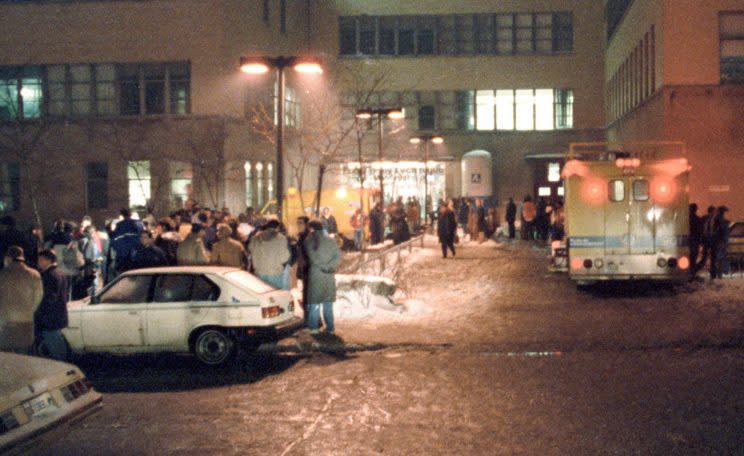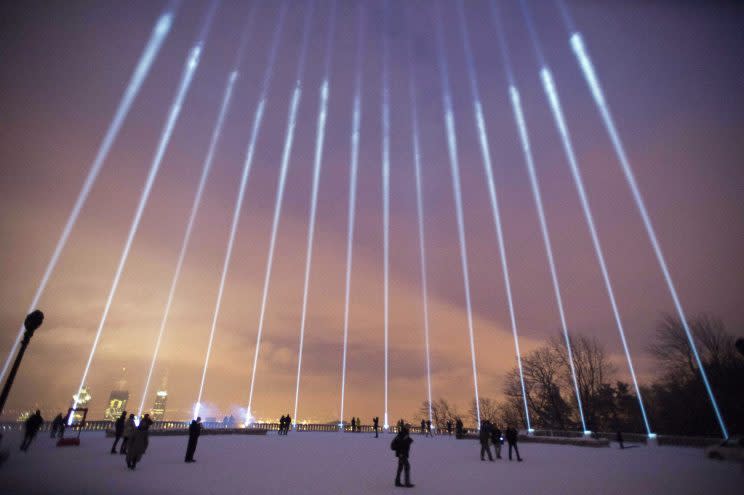Survivors, activists work to keep the lessons of the Montreal Massacre resonating with young Canadians

It’s been 27 years since the École Polytechnique massacre in Montreal. The tragic event shook Canadians and set in motion a new chapter in the history of gun control in the country.
What took place in the years after the shooting rampage by gunman Marc Lépine that left 14 women dead defined the lives of some of the survivors in ways they didn’t expect.
Nathalie Provost and Heidi Rathjen were both there that day in 1989. Provost, who survived being shot four times by Lépine, and Rathjen both became important voices in the fight for gun control in Canada.
Rathjen was part of the group that drove the government to pass gun control policies just six years after the tragedy. Despite facing some setbacks along the way, at the time, Rathjen said what they accomplished was satisfactory.
“It contained the main measures of effective gun control,” she said.
More from our series:
Remembering the 14 victims of the École Polytechnique massacre
‘I thought everything we’d gained, we’d have it forever’: Survivors of the Montreal Massacre on the vulnerability of progress
Montreal Massacre left ‘indelible mark’ on an engineering community still striving for more women
PHOTOS: 10 celebrities who spoke out on violence against women
VIDEO: How millennials are remembering the Montreal Massacre
A lot has changed since, with the Conservative government dismantling the long-gun registry in 2012. Rathjen and Provost are hoping the Liberal government sticks to its election campaign promise of reversing “the damage that was done,” in Rathjen’s words.

Twenty-seven years later and Rathjen is still fighting for stricter gun laws in Canada.
“Gun control was a true homage to those 14 women. Many families have told us that the best thing we can do to cherish the memory of their daughters is to do something concrete that will save lives,” Rathjen said.
The end goal?
“The three pillars of gun control are licensing of gun owners, control on guns and a ban on weapons that are designed solely for the purpose of killing other human beings,” the long-time advocate told Yahoo Canada News.
While there have been other gun-related incidents in Canada, none of them touched a nerve so deep that it brought on a revolution in how the country deals with guns, according to Rathjen.
“The law changed, but the perception changed as well,” she said.
It’s easy to say that a generation of young Canadians have grown up not knowing what the tragedy truly felt like.
Michèle Thibodeau-DeGuire, the first woman engineer to graduate from L’Ecole Polytechnique in 1963, thinks so.
“I would say it resonates with older Canadians and maybe the younger generation doesn’t fully understand what did happen,” she said.
A group of young students at Marc Garneau Collegiate Institute in North York, Toronto, are working to change that perception. Lisa Wang runs a student-led initiative that hosts different campaigns and events to raise awareness every month about an issue.

The group is having a march on Tuesday to honour the 14 women killed in 1989. They are also running an orange ribbon campaign to raise awareness about violence against women.
Wang, a Grade 11 student, said they picked the colour orange in support of the UN’s Say No-Unite campaign, a violence against women initiative.
“What happened 27 years ago is so critical to address today because I know a lot of my friends, and myself, want to study engineering going into university,” Wang told Yahoo Canada News.
“The women [at the École Polytechnique] just wanted to go to school and study but the misogyny that was present took their lives away. That’s something that’s really scary to us,” the young student said.

At the University of Toronto, students built a monument to commemorate the anniversary.
Danja Papajani, a 19-year-old electrical engineering student, hopes that what is built will spark a conversation for younger Canadians who are unaware of the shooting.
“We have 14 statues cut out of wood that will be lit up, and in the middle there will be panels that describe the event that happened and one with resources for others to do further research,” Papajani said.
The young student said while something like a monument may seem insignificant in comparison to other events, it gives her hope that her concerns, as a feminist and a woman in engineering, are being heard.
“The leaders in our student body are recognizing that our experiences of pursuing this field aren’t always the same as our male counterparts. It’s a step in the right direction,” she said.

There are numerous campaigns, marches and events held every year across Canada.
In Montreal, Thibodeau-DeGuire said they will lay 14 white roses at the doorstep of École Polytechnique in memory of the victims.
Fourteen beams of light will be projected into the sky from Montreal’s Mount Royal as well.
Meanwhile in Toronto, hundreds are expected to gather for a candlelight vigil run by a non-profit organization called Women Won’t Forget.
One of the members, Shirley Gillett, said the tribute has been happening every year since 1990. The grassroots group mobilized after the shooting.

“I don’t even know if I can describe how strong the feeling was,” she said, referring to how she felt on Dec. 6, 1989. “There was just this urge of needing to get together with other women and people who cared about this,” Gillett said.
For Gillett, who is now her in 50s, the tragic event acted as a “coming out,” breaking her silence about her own experiences.
“I had experienced violence as a teenager and in my early 20s. When the shooting happened, a lot of women made the immediate connection to their own lives and to the violence they experienced from men,” she said.
“I do specifically let people know that I’m also a survivor to give support to other survivors. It’s still not an easy world to come out and admit that,” Gillett said.
While the tributes help keep the memory of the women who died that day front and center, there are also other themes highlighted, such as being a support system to others, sparking a conversation and pushing concrete measures that will help save lives.
Provost says that it’s still possible for a tragic event like what happened at Polytechnique to take place today, so speaking out is important.
The anniversary is the time that we ask the public to speak out in favour of gun control,” Rathjen said. “There’s no end to it.”


